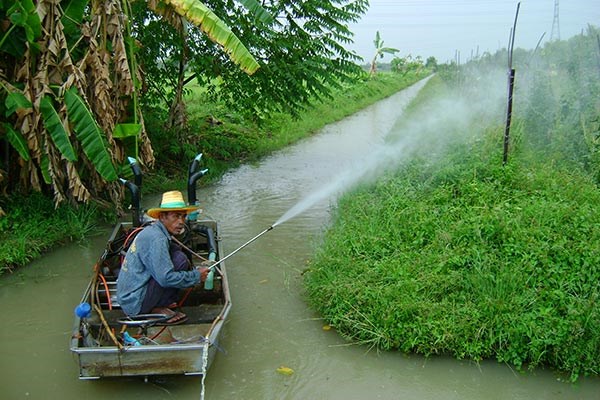NIH Grant Establishes Center of Excellence

11/12/2015
By Karen Angelo
The National Institutes of Health (NIH) awarded UMass Lowell and Mahidol University in Thailand a $3 million grant to conduct research that aims to improve agricultural health in Southeast Asia.
The five-year grant is one of seven awarded by NIH to establish Global Environmental and Occupational Health Hubs (GEOHealth Hubs), regional research and training centers in low to middle income countries.
“We’re excited about the opportunity to increase research capacity with our Thai colleagues to help improve the health of farmers in Thailand and around the globe,” says Prof. Susan Woskie of the Department of Work Environment in the Division of Public Health. “Our first project is to see whether some widely-used pesticides used in Southeast Asian agriculture act as endocrine disrupters, leading to diabetes, stroke and coronary diseases, all on the rise in Thailand.”
More than 60 percent of the world's agricultural workers live in developing countries, with the majority in the Asia Pacific region. Within Thailand, more than 40 percent of the working population is in agriculture.
The research team will evaluate changes in hormones among organic and pesticide-using farmers and study Thailand’s universal healthcare system data to track metabolic disorders by occupation.
Increasing Research Excellence to Tackle Major Health Issues
An important component of the GEOHealth Hub is to build research capacity at Mahidol University, at the Thai Ministry of Public Health and with other partners in Southeast Asia. GEOHealth Hub faculty partners from UMass Lowell, Mt. Sinai School of Medicine and Rutgers University will train junior faculty and medical staff using a mentoring model that encourages the establishment of ongoing research teams.
“The goal of the training is to develop a strong international, interdisciplinary collaborative research group that will continue to work together in the future,” says Woskie.
Selected post-doctoral trainees will work with a Thai or other Southeast Asian mentor, and a U.S. faculty mentor to conduct an agricultural health research project. Future projects may expand into other related occupational and environmental health issues such as safety and musculoskeletal disorders, climate change, other chronic diseases and neurobehavioral health.
“Since Mahidol is a large prestigious public university that is very strong in sciences, medical sciences and engineering, and also has a vibrant social science program including peace studies, my hope is for us to expand our UMass Lowell research partnerships and to foster a student exchange program in the future,” says Woskie.
